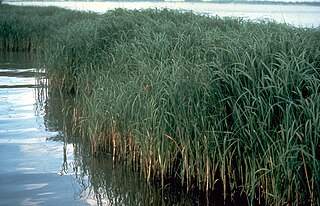Related Research Articles

A halophyte is a salt-tolerant plant that grows in soil or waters of high salinity, coming into contact with saline water through its roots or by salt spray, such as in saline semi-deserts, mangrove swamps, marshes and sloughs and seashores. The word derives from Ancient Greek ἅλας (halas) 'salt' and φυτόν (phyton) 'plant'. Halophytes have different anatomy, physiology and biochemistry than glycophytes. An example of a halophyte is the salt marsh grass Spartina alterniflora. Relatively few plant species are halophytes—perhaps only 2% of all plant species. Information about many of the earth's halophytes can be found in the ehaloph database.

Acidobacteriota is a phylum of bacteria. Its members are physiologically diverse and ubiquitous, especially in soils, but are under-represented in culture.

Endemism is the state of a species being found in a single defined geographic location, such as an island, state, nation, country or other defined zone; organisms that are indigenous to a place are not endemic to it if they are also found elsewhere. For example, the Cape sugarbird is found exclusively in southwestern South Africa and is therefore said to be endemic to that particular part of the world.

The National Forests Office, or ONF, is a Government of France agency that manages the state forests, city forests and biological reserves. ONF is based in Paris.

Leccinum aurantiacum is a species of fungus in the genus Leccinum found in forests of Europe, North America, and Asia and has a large, characteristically red-capped fruiting body. In North America, it is sometimes referred to by the common name red-capped scaber stalk. Some uncertainties exist regarding the taxonomic classification of this species in Europe and North America. It is considered edible.
The Gemmatimonadota are a phylum of bacteria established in 2003. The phylum contains two classes Gemmatimonadetes and Longimicrobia.
Mycobacterium arupense is a slowly growing mycobacterium first isolated from soil and human sputum samples in Spain. Etymology: arupense, pertaining to the ARUP Institute for Clinical and Experimental Pathology, where the type strain was characterized.

Geotrichum candidum is a fungus which is a member of the human microbiome, notably associated with skin, sputum and feces where it occurs in 25–30% of specimens. It is common in soil and has been isolated from soil collected around the world, in all continents.

Lytocaryum is a monoecious genus of flowering plant in the palm family endemic to the Atlantic coast of Brazil, where 4 species are known. Palms once classified as Microcoelum are herein included; the genus is closely related to Syagrus, from which it is differentiated only by abundant tomentum, strongly versatile anthers, and slight epicarp, mesocarp, and endocarp differences. The name is Greek for "loose" and "nut".
Antarctica is one of the most physically and chemically extreme terrestrial environments to be inhabited by lifeforms. The largest plants are mosses, and the largest animals that do not leave the continent are a few species of insects.

Lorenzo Insigne is an Italian professional footballer who plays as a forward for Serie A club Napoli, for which he is captain, and the Italy national team. He has signed a pre-contract to join Major League Soccer club Toronto FC beginning 1 July 2022.
Agromyces is a genus in the phylum Actinomycetota (Bacteria).
Roberto Insigne is an Italian professional footballer who plays as a forward for Benevento. He is also the younger brother of current Napoli captain, Lorenzo Insigne.
Filomicrobium is a genus of bacteria from the family of Hyphomicrobiaceae which was first described in 1987 by Schlesner
Filomicrobium fusiforme is a Gram-negative, aerobic, motile bacteria from the genus of Filomicrobium which was isolated from brackish water in Germany.
Laceyella is a Gram-positive, thermophilic, spore-forming and aerobic bacterial genus from the family of Thermoactinomycetaceae. The genus Laceyella is namened after the English microbiologist John Lacey.
Mucilaginibacter is a genus from the family of Sphingobacteriaceae.
Niastella is a bacterial genus from the family of Chitinophagaceae.
Sphaerisporangium is a Gram-positive genus of bacteria from the family of Streptosporangiaceae.
Phycicoccus ginsengisoli is a species of Gram positive, strictly aerobic, non-endosporeforming bacterium. The species was initially isolated from soil from a ginseng field in Gochang County, South Korea. The species was first described in 2016, and its name refers to the source of isolation.
References
- ↑ LSPN lpsn.dsmz.de
- ↑ Straininfo of Filomicrobium insigne
- ↑ UniProt
- ↑ Wu, X. -L.; Yu, S. -L.; Gu, J.; Zhao, G. -F.; Chi, C. -Q. (2009). "Filomicrobium insigne sp. nov., isolated from an oil-polluted saline soil". International Journal of Systematic and Evolutionary Microbiology. 59 (2): 300–5. doi: 10.1099/ijs.0.65758-0 . PMID 19196769.